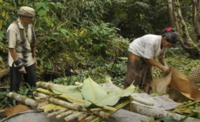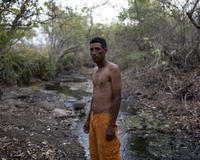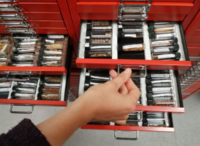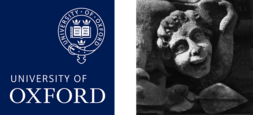Outreach & PER Resources
Resources for Public Engagement with Research (PER)
Public Engagement with Research (PER), describes the many ways that members of the public can be involved in the design, conduct and dissemination of research. High-quality engagement is a two-way process with the goal of generating mutual benefit between the public and researchers and ultimately enhancing the quality or impact of research.
The University of Oxford's Public Engagement with Research Strategic Plan can be viewed here. In line with this plan, the School of Archaeology aims to equip its academics and researchers to deliver high-quality PER activities and to foster a culture in which they are recognised for their accomplishments. The School encourages staff to embed PER activity into the planning and resourcing of new projects and commits to publicising and celebrating examples of best practice within the University and to the wider world.
This page will be updated with useful links and guidance. In the meantime, if you have any questions or are interested in getting involved with PER and outreach activities at the School, please contact Robyn Mason (news@arch.ox.ac.uk). If you would like to be kept up to date with Public Engagement with Research news, sign up to the monthly PER digest news bulletin by emailing publicengagement@admin.ox.ac.uk including ‘Start PER DIGEST’ in the email subject line.
Download our 'How to start a Public Engagement with Research (PER) Project or Event' guidance document.
Virtual PER – If you want to find out more about online engagement you can find guidance about running live events from the University here, as well as from the National Co-ordinating Centre for Public Engagement here.
Equipment - to book equipment for a PER event please email per@arch.ox.ac.uk
GDPR photo permission form https://staff.admin.ox.ac.uk/article/photography-and-gdpr-toolkit
Risk assessments for events [click here to download an example form for an event at the Ashmolean Museum]
Evaluation template and PER Table of Evaluation Tools. Further advice on planning and undertaking evaluation, and training opportunities can be found at the University PER page here
More than Money: Rethinking Coins in the British Iron Age – PI Courtney Nimura
The River Flow Memory Book Project – PI Alexander Guerds & Irene Torreggiani
Farming: the first 12,000 years – PI Jade Whitlam
From the Neolithic to the Table – Juanjo Garcia-Granero
LANDE: the Calais “Jungle” and Beyond – Dan Hicks and Sarah Mallet
From Mine to Metal – Peter Hommel & Samantha Bowring
The School is committed to developing a wide range of ways to engage and collaborate with our public in the design, conduct and dissemination of our research.
The Penan and their plants

Project Lead: Professor Chris Gosden
The Penan of Borneo are one of the last hunter-gatherer groups in southeast Asia and their lifestyle is under threat. This project, run by Chris Gosden, Huw Barton (Leicester) and Rory Carnegie focused on crucial three plant species: sago, rattan and bamboo, with short films documenting peoples’ use of the plants from gathering materials in the rainforest to finished products. They interviewed people concerning life in the rainforest, gaining some sense of their use of territory, the seasonal round and spiritual attachment to landscape. Carnegie took portraits of people in settings of their choosing, often with newly acquired white wares! They will curate a display of a selection of the photographs around the School buildings and screen the films to provide insights into contemporary hunter-gatherer life in the rainforest.
Playing with Fire: Making Metal in the Past

Project Leads: Dr Philippa Howarth and Dr Victoria Sainsbury
Victoria and Philippa will be building an Iron Age style copper furnace and related equipment such as bellows in order to demonstrate and experiment with prehistoric copper smelting, challenging assumptions about ancient metalwork. They will produce a podcast series documenting everything, from building the furnace to making the bellows, explaining the scientific background behind the chemical reaction and introducing archaeological research concerning the development of metallurgy across prehistoric Eurasia. Victoria and Philippa will film and demonstrate their FLAME-project related experiments, discussing both their research interests, techniques and results.
More than Money: Rethinking Coins in the British Iron Age
Project Lead: Dr Courtney Nimura
The introduction of coins is seen as marker of change in Iron Age society in Britain. It is easy to see these early coins as equivalent to today’s money, but current research challenges this assumption. As part of the More than Money project, participants will make their own coins, inspect genuine Iron Age and oversize replicas, and explore 3D models of coins online. Drawing on research by the Celtic Coin Index Digital (CCID) team, we will inspire audiences to think about how coins were made and used and what this tells us about society in Iron Age Britain.
The River Flow Memory Book Project

Project leads: Dr Alexander Geurds and Irene Torreggiani and Alvaro Laiz
The River Flow Memory Book project aims to raise awareness in Nicaraguan communities concerning the value of archaeology and traditional knowledge, for understanding surrounding fluvial environments and to assist in dealing with the increasing problems of water availability. Departing from the archaeological and ethnographic work by Irene and Alex, it involves a collaboration with the artist and photographer Alvaro Laíz (http://www.alvarolaiz.com/). The project applies botanical, ethnographic and geoarchaeological knowledge, combined with storytelling and photographic techniques, in recording past and present knowledge related to local rivers and sources of water across four rural communities in central Nicaragua. Through personal interviews, community members were asked to describe their different relationships with surrounding fluvial environments. In March 2020, finally, this geoarchaeological and local knowledge was discussed with the involved communities during a Public Engagement event, held in a community cultural center, the Casa de Cultura, purpose-built as part of Alex’s long-term project at the Aguas Buenas site. This photo is a portrait of Mauro Jeovani Rios from Aguas Calientes by Alvaro Laiz (photographer).
Digging for Meaning: Research from the Oxford School of Archaeology
Project Leads: Dr Victoria Sainsbury and Dr Philippa Howarth
Digging for Meaning will be the first podcast/video series by the School of Archaeology, with a particular focus on work by Early Career Researchers. More people than ever are turning to education resources online, but most archaeological material is aimed at young children or created by non-specialists. This series will be aimed at adults, serving as an introduction to archaeological concepts, cutting edge findings, and fascinating fieldwork. This project will build a base for further podcast series from the School. Anyone interested in contributing a podcast, with production and assistance provided, please contact Victoria directly. We hope to release the first podcast before Michaelmas 2020.
Public engagement archaeobotany kits

Project Lead: Dr Elizabeth Stroud
Liz is constructing botanical kits to support demonstrations at public engagement events. The kits will include a range of archaeobotanical specimens in vials, as well as the equipment needed to examine them. The specimens will be tailored to specific activities, themes and current projects within the department. Information cards will provide detailed descriptions of the cultivation, processing and/or past use of the taxa included. These kits will be adaptable for engagement with different audiences and include themes ranging from crop processing/flour production to alcohol flavourings, plant domestication and medieval crop rotation.



